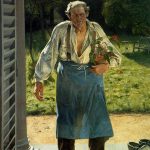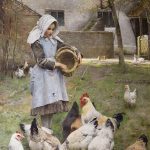
From 1869 to 1874, Claus trained at the Antwerp Academy of Fine Arts with, amongst others, the landscape painter Jacob Jacobs. During his training, Claus attracted the attention of and found favour with the local upper middle class.
In 1882 Claus had completed Cock Fight in Flanders, The realistic painting portrays the dignitaries of Waregem, collected around a small arena with two fighting roosters.
One of the dignitaries was the Waregem notary Eduard Dufaux. At the notary’s home, Emile got to know Eduard’s niece Charlotte Dufaux. They got married in 1886.
Success Comes Claus’s Way
Artistically and financially, Claus soon prospered. The Antwerp Museum of Fine Arts purchased one of his works, and The Picknick (1887), his well-known painting showing a farmer’s family watching the Sunday outing of the urban bourgeoisie on the opposite bank of a small river (the Lys), was bought by the Belgian Royal Family.
Under the influence of Claude Monet, he developed a style that has been characterized as luminism. In 1904, he started the artist group Vie et Lumière (‘Life and Light’).
In 1918, at his return from London after World War I and with the dawn of expressionism, Claus found his fame diminished. In 1921, he was given



